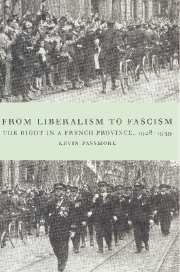Book contents
- Frontmatter
- Contents
- List of illustrations
- Preface
- List of abbreviations
- 1 Introduction
- 2 From France to the Rhône
- 3 Urban society in the Rhône
- 4 Rural society in the Rhône
- 5 The crisis of the right I: 1928–1932
- 6 The impact of the economic crisis
- 7 The crisis of the right II: 1932–June 1936
- 8 The Croix de Feu
- 9 The right and the Popular Front
- 10 Conclusion
- Appendix 1 Equations for multiple regressions
- Appendix 2 The conservative deputies of the Rhône, 1928–1940
- Select bibliography
- Index
5 - The crisis of the right I: 1928–1932
Published online by Cambridge University Press: 23 December 2009
- Frontmatter
- Contents
- List of illustrations
- Preface
- List of abbreviations
- 1 Introduction
- 2 From France to the Rhône
- 3 Urban society in the Rhône
- 4 Rural society in the Rhône
- 5 The crisis of the right I: 1928–1932
- 6 The impact of the economic crisis
- 7 The crisis of the right II: 1932–June 1936
- 8 The Croix de Feu
- 9 The right and the Popular Front
- 10 Conclusion
- Appendix 1 Equations for multiple regressions
- Appendix 2 The conservative deputies of the Rhône, 1928–1940
- Select bibliography
- Index
Summary
The social and ideological conflicts described in the two previous chapters had a significant impact on conservative politics in the Rhône. The heirs of Progressisme in the Fédération républicaine represented, in terms of our categories, an example of the constitutional-elitist right. Sovereignty was located in a parliamentary system designed to keep power in the hands of a small group said to be qualified by wealth and talent to know what was best for an indivisible nation. The Fédération therefore eschewed formal party organisation and relied on indifference and deference for mass support. Bodies intermediate between parliament and the individual, political parties included, had little role to play. Thus Aynard supported the Fédération but never occupied a formal position in the party, preferring to cultivate an image of independence. Yet the 1920s witnessed developments which undermined this elitism. A significant number of corporate and professional associations had developed. Neocapitalists, their allies in the Alliance démocratique and Christian democrats sought to complement ‘formal’ political democracy with a network of professional associations, topped by an ‘economic council’. At the same time the Church began to mobilise its organisational resources within the republican system. Catholics also spoke of reconciling individual and society through involvement in professional associations.
The result in the Rhône was that by 1932 the party system had undergone a significant modification. The influence of big business in local politics declined dramatically. Some, like Auguste Isaac, turned to the Alliance democratique, which in terms of its constitutional-elitist structures and moderate republicanism doubtless reminded him of the Fédération of his youth.
- Type
- Chapter
- Information
- From Liberalism to FascismThe Right in a French Province, 1928–1939, pp. 116 - 162Publisher: Cambridge University PressPrint publication year: 1997



